Photo: Steve Granitz/WireImage
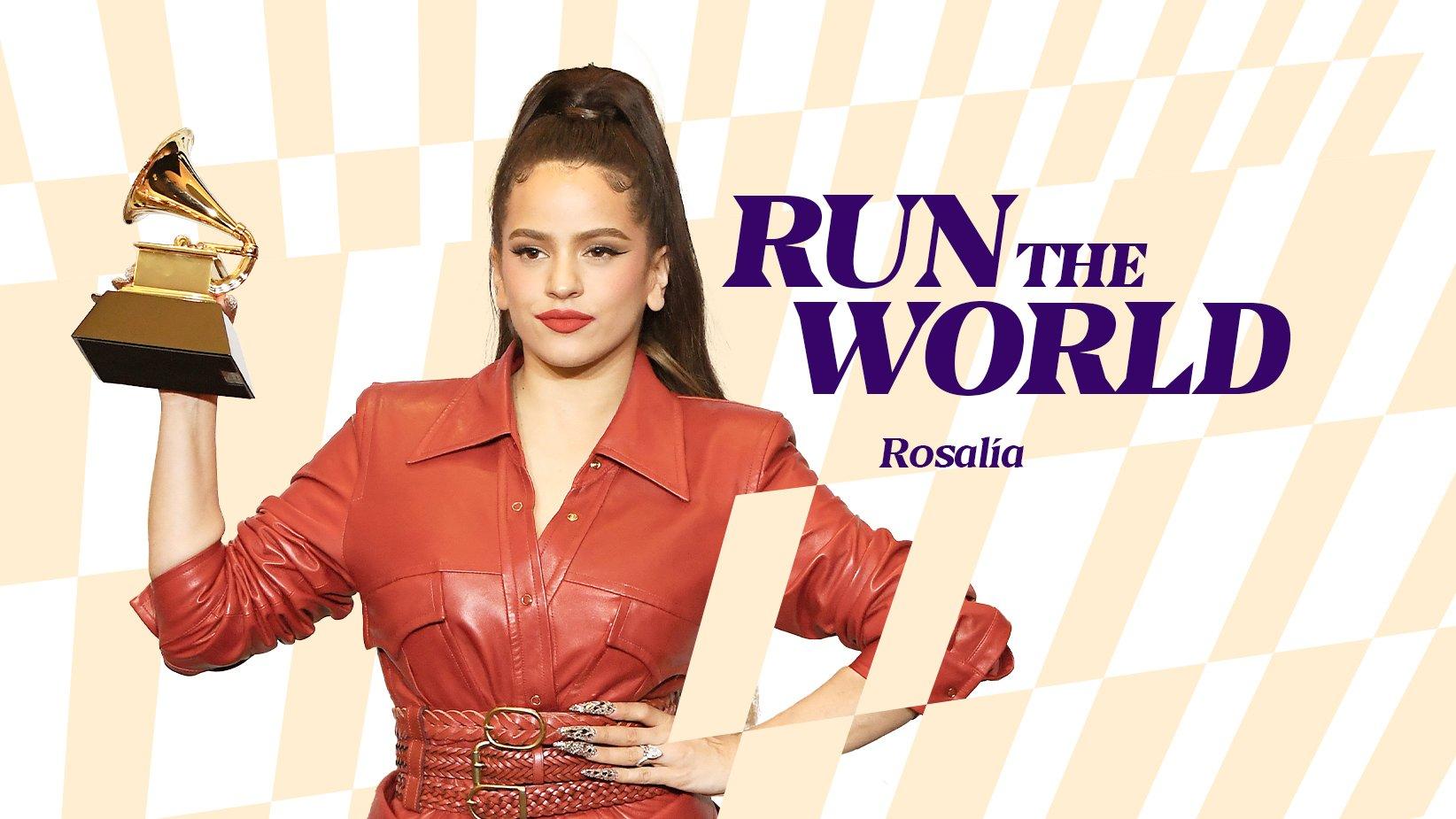
video
Run The World: How Rosalía Became An International Superstar And Production Powerhouse
To commemorate Women's History Month, take a look at Rosalía's colossal career, from her 'Los Ángeles' folk debut to her GRAMMY-winning experimental, flamenco-pop album, 'Motomami.'
Rosalía is the pop star the music industry has craved for so long — an unapologetic, risk-taking visionary who transforms each album release into a deliberate era, slowly immersing her audience deeper into her creative universe. She has become a vanguard for music's next generation of female leaders, paving the way through her commitment to building equality as she once promised in her 2019 Billboard Women in Music speech: "I will never stop till I find and I see the same number of women in the studio."
But before the global sensation came to be, there was Rosalia Tobella, the hopeful musicology student from the suburbs of Barcelona with a passion for flamenco and dream of becoming one of music's biggest disruptors. Her nights spent singing and dancing at flamenco venues eventually landed her in the hands of hitmaker Raül Refree, who manifested her big-city ambitions into reality, co-producing and arranging her critically-acclaimed debut studio album, Los Ángeles.
The flamenco-inspired folk album set the precedent for Rosalía's prosperous musical career after snagging the Spanish singer her very first Latin GRAMMY nomination for Best New Artist and producing a slew of live appearances that led to her catching the attention of her label, Columbia Records. Today, Rosalía's flamenco roots continue to paint her discography on award-winning albums El Mal Querer and Motomami.
As a part of GRAMMY.com's ongoing celebration of Women's History Month, we're looking back at Rosalía's monumental career, from Los Àngeles to Motomami, in this installment of Run The World. It's not just Rosalía's artistic genius that makes her story so remarkable, but also her trailblazing achievements and strides to make space for like-minded women.
What distinguishes Rosalía in a saturated market is her consistency. Without coming across as repetitive, Rosalía seamlessly innovates new ways to transform flamenco as she fuses its essence into different genres on each release. This level of brilliance garnered Rosalía praise from Billboard for "changing the sound of today's mainstream music" at the 14th Women in Music event, acknowledging the artist with a Rising Star Award.
Over the past six years, Rosalía has amassed nearly 60 awards in total, most notably her 11 Latin GRAMMY wins. Three years after winning the Latin GRAMMY for Album Of The Year for El Mal Querer in 2019, she took home the award again in 2022 for Motomami — becoming the first woman in Latin GRAMMY history to win the category twice.
In 2020, Rosalía marked her GRAMMY stage debut with a medley performance of "Juro Que'' and her breakthrough single, "Malamente." Earlier that night, she celebrated another groundbreaking achievement as the first all-Spanish-language artist to be recognized in the Best New Artist category, as well as her first GRAMMY win for Best Latin, Rock or Urban Alternative album for El Mal Querer. (She won the category for the second time at this year's GRAMMY Awards for Motomami.)
"It's such an honor to receive this award, but at the same time, what I'm most excited about is that I'll be able to perform a flamenco-inspired performance for all of you," Rosalía said during her 2020 GRAMMY acceptance speech, noting her position as one of the leading voices in sharing flamenco culture with American media. "Thank you for embracing [this] project with so much love."
Above all the accolades remains Rosalía's women-first attitude, taking into account the legacy of women who built the foundation for her empire. "I want to thank women like Lauryn Hill, WondaGurl, Björk, Kate Bush, Ali Tamposi, Nija — all the women in the industry who taught me that it can be done," exclaimed Rosalía during her acceptance speech for Best Urban Fusion/Performance at the 2018 Latin GRAMMYs.
And now, she's leaving her own impact on our future leaders.
In a full-circle moment, Rosalía was honored as the inaugural Producer Of The Year at the 2023 Billboard Women in Music ceremony, presented to her by one of her aforementioned heroes, WondaGurl. "To me, it feels special because this is not usual. I make my own music, I produce my own songs, and I write my own songs. I want to dedicate this award to all the women who are going to be producers," she beamed.
Press play on the video above to revisit the defining moments in Rosalía's revolutionary stardom, and keep checking back to GRAMMY.com for more new episodes of Run The World.
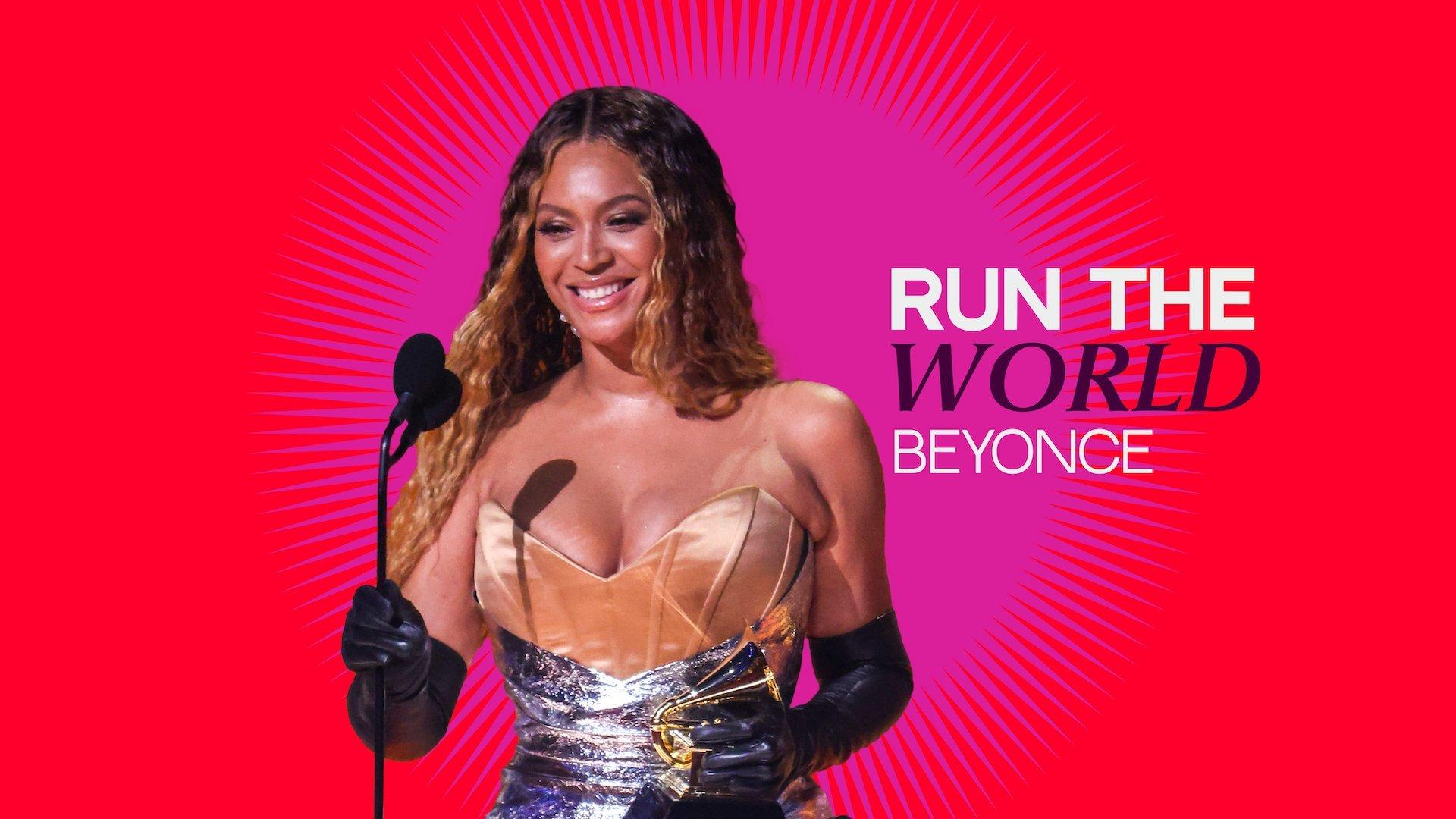
Photo: Frazer Harrison/Getty Images
video
Run The World: Why Beyoncé Is One Of The Most Influential Women In Music History
Relive a few of the moments that made Beyoncé the global icon she is today, from her debut with Destiny's Child in 1997 to becoming the most awarded musician in GRAMMY history in 2023.
Since her debut with Destiny's Child in 1997, Beyoncé has become one of the most decorated, record-breaking artists of all time.
In 2023, Queen Bey became the artist with the most GRAMMYs in history with 32 wins, after her seventh album, RENAISSANCE, won Best Dance/Electronic Music Album. That same LP also helped Beyoncé become the first female musician to have their first seven studio albums debut at No. 1 in the United States.
Earlier this year, she became the first Black woman to top Billboard's Hot Country Songs chart with "TEXAS HOLD 'EM," the lead single from her forthcoming album, COWBOY CARTER.
Beyond her chart achievements, Beyoncé has dedicated much of her work to uplifting women and exploring the Black experience, from Destiny's Child's "Independent Women, Part 1" to 2011's "Run the World (Girls)" and her 2016 album, Lemonade.
To add to her extensive resume, Beyoncé is also an active philanthropist and businesswoman. Through her BeyGOOD charity, she has championed countless causes, including education for young girls. Earlier this year, Beyoncé launched her hair care brand, Cécred, alongside an annual student scholarship and salon grant.
Among the many ways Bey has uplifted women around the world, her message to 2020 graduates perfectly summed up her influence: "Make those power moves, be excellent."
Press play on the video above to learn more about Beyoncé's colossal career. Check back to GRAMMY.com for more new episodes of Run the World, as well as for more news on Beyoncé's highly anticipated COWBOY CARTER.
Enter The World Of Beyoncé
Beyond Country: All The Genres Beyoncé Explores On 'Cowboy Carter'
Beyoncé Is The Genre-Bending Queen On 'Cowboy Carter': 5 Takeaways From Her New Album
Beyoncé's New Album 'Cowboy Carter' Is Here: Check Out The Featured Artists, Cover Songs, And Tracklist
Everything We Know About Beyoncé's New Album, 'Cowboy Carter': Two New Singles, Tracklist, A Shift To Country & More
How Beyoncé Is Honoring Black Music History With 'Cowboy Carter,' "Texas Hold Em," 'Renaissance' & More
Songbook: The Complete Guide To The Albums, Visuals & Performances That Made Beyoncé A Cultural Force
A Timeline Of Beyoncé's GRAMMY Moments, From Her First Win With Destiny's Child to Making History With 'Renaissance'
How Many GRAMMYs Has Beyoncé Won? 10 Questions About The 'Renaissance' Singer Answered

Watch Beyoncé Make GRAMMY History With Her 32nd Win In 2023 | GRAMMY Rewind
6 Takeaways From 'Renaissance: A Film By Beyoncé'
Beyoncé's 'Dangerously In Love' Turns 20: How The Solo Debut Foreshadowed The Singer's Icon Status
5 Takeaways From Beyoncé's New Album 'Renaissance'

How Beyoncé Has Empowered The Black Community Across Her Music And Art | Black Sounds Beautiful

The Creative Rebirth Of Beyoncé On '4' | For The Record
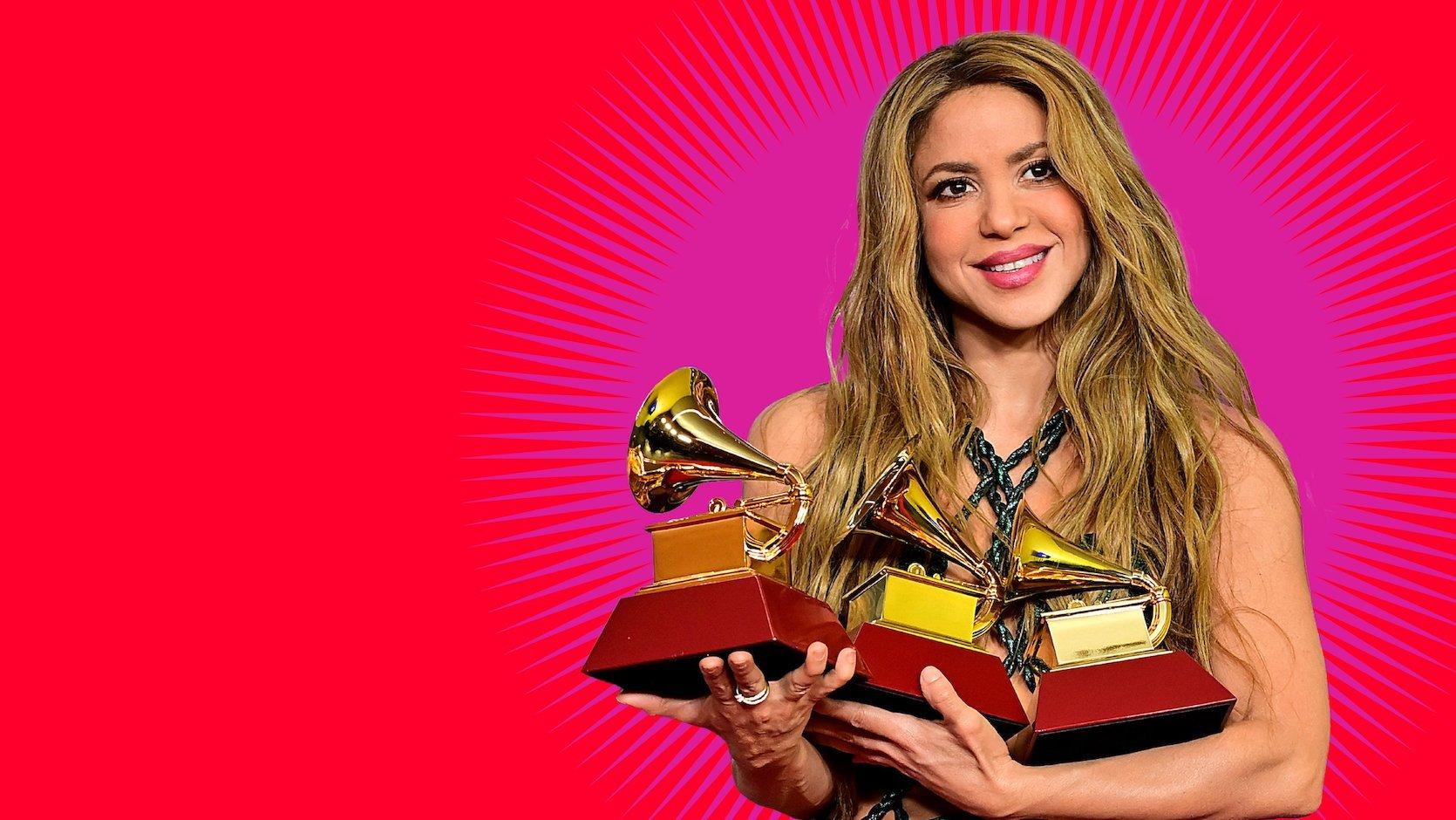
Photo: Niccolo Guasti/Getty Images
video
Run The World: How Shakira Became One Of The Most Influential Female Artists Of The 21st Century
In celebration of Women's History Month — and Shakira's new album, 'Las Mujeres Ya No Lloran' — take a journey through the Colombian superstar's monumental career, from making global smashes to empowering women worldwide.
Over the course of nearly four decades, Shakira — born Shakira Isabel Mebarak in Barranquilla, Colombia — has become the best-selling Latin female artist of all-time, and in turn one of the most influential female artists of her time.
In honor of Women's History Month, revisit a few of the massive moments in her career that paved the way for the international market of other Latin artists.
She famously invited Latin flow to the Western music industry with her global breakthrough album, 2001's Laundry Service. Five years later, she broke the record for the most-played pop song in a week with "Hips Don't Lie."
Since the beginning, Shakira has used her powerful performances to uplift other women. Her lyrics often emphasize themes of self-reliance, independence, and female strength, most notably in her 2009 hit, "She Wolf."
More than three decades into her career, Shakira is still empowering women with more history-making feats. In 2020, she co-headlined the Super Bowl LIV halftime show alongside Jennifer Lopez, celebrating Latin culture in front of more than 100 million viewers; it's now the most-watched halftime show on YouTube, with more than 308 million views as of press time.
Now, at 47, Shakira continues to use her voice to encourage women to shape their own path, as a mother of two balancing her colossal career. Her forthcoming twelfth studio album — Las Mujeres Ya No Lloran, which translates to "Women No Longer Cry" — is a testament to that.
In celebration of Las Mujeres Ya No Lloran's March 22 arrival and Women's History Month, press play on the video above to learn more about Shakira's achievements. Check back to GRAMMY.com for more new episodes of Run The World.
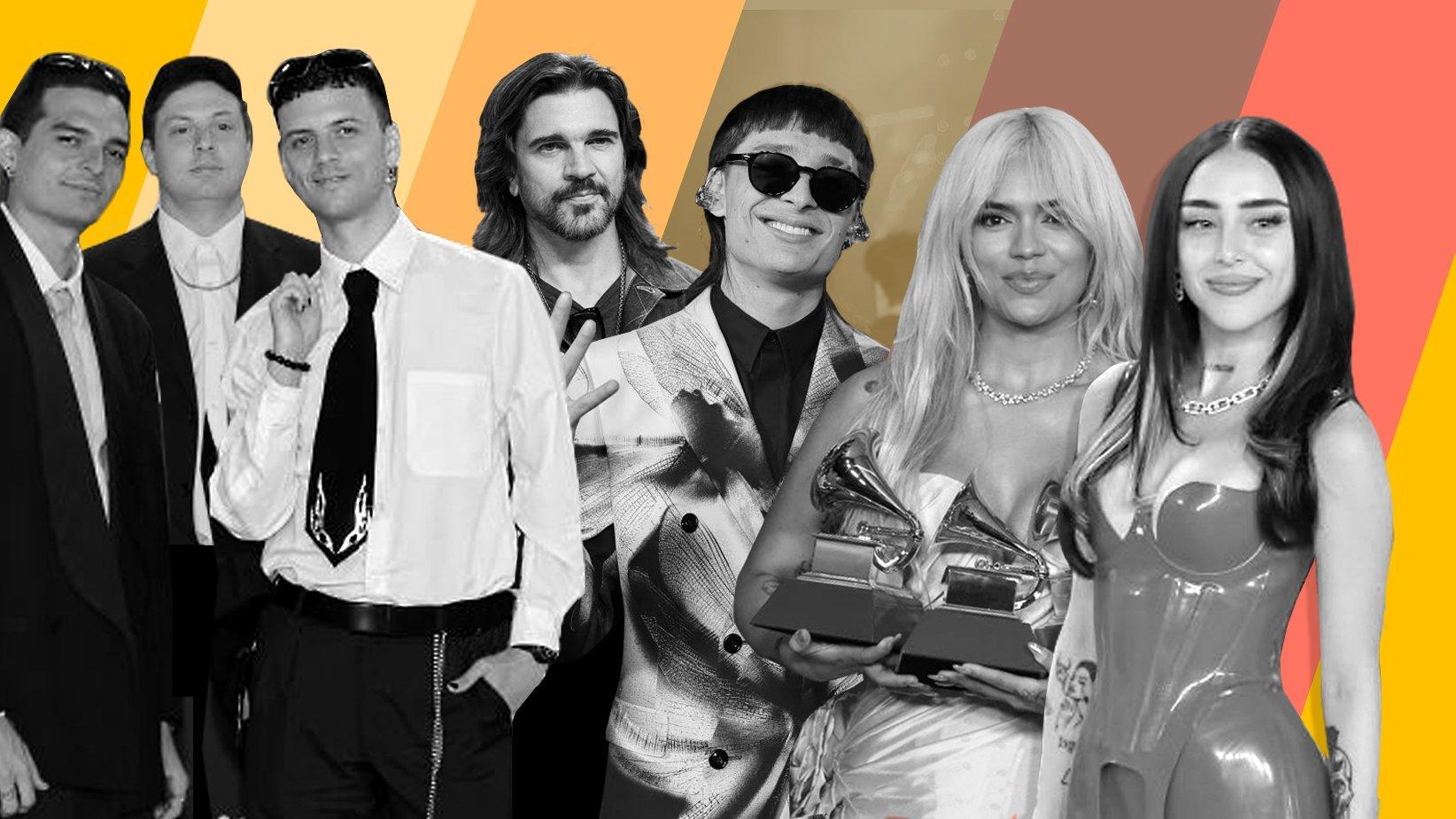
Photos: Neilson Barnard/Getty Images for Latin Recording Academy; Borja B. Hojas/Getty Images; Neilson Barnard/Getty Images for Latin Recording Academy; Patricia J. Garcinuno/WireImage; Juan Naharro Gimenez/Getty Images
news
2023 In Review: 5 Trends That Defined Latin Music
2023 was a transformative year for Latin music: Música mexicana expanded globally; urbano music continued its dominance and innovative sounds broke boundaries. Read on for five trends showcasing the breadth of Latin music's influence.
2022 was the year of Rosalía’s Motomami and Bad Bunny’s Un Verano Sin Ti — two groundbreaking albums that expanded both the artistic scope and mainstream appeal of Latin music. How do you top that?
As it turns out, 2023 had a number of surprises in store: the emergence of música mexicana on an international scale, but also the further globalization of Latin sounds and new developments in urbano music, which continues to gain in influence and sophistication. It was also a particularly prolific year — with hundreds of singles, EPs and albums expanding the scope of Latin across genres and formats.
Here are some of the notable trends that emerged during the past 12 months.
Finally, Música Mexicana Gets The Chance To Shine
Reggaetón and urbano were at the forefront of the Latin music tsunami that began to take hold of the entire planet a good three years ago. During that time, many insiders pondered if the huge field of so-called regional Mexican music would ever enjoy such levels of exposure. Turns out there was nothing regional about it.
Far from stagnating, the genre evolved with the rise of the sparse, melancholy sound known as sad sierreño, and the swagger of hip-hop informing the zeitgeist of young artists like Natanael Cano and Junior H.
2023 will be forever remembered as the year when música mexicana connected with the world at large, and it happened mostly through one song: "Ella Baila Sola," the collaboration between Jalisco singer Peso Pluma and Cali group Eslabón Armado — a tune whose spiraling groove is so buoyant and infectious, it transcends borders. The subversive duet of Bad Bunny and Grupo Frontera on mega-hit "un x100to" didn’t hurt either, and the movement gained strength with Peso Pluma’s excellent third LP, as well as the talents of young stars such as Fuerza Regida, Gabito Ballesteros and Yahritza y Su Esencia.
When It Comes To Latin Rock, Argentina Is Still At The Forefront
From Charly García and Luis Alberto Spinetta to Soda Stereo and Babasónicos, Argentina boasts a fierce tradition for generating legendary rock albums. Even though the South American nation has embraced the present with such urbano stars as Bizarrap, Duki and Nicki Nicole, there will always be a place of honor reserved for good old fashioned rock’n’roll in Argentina’s clubs and recording studios.
2023 was no exception. Hailing from the city of La Plata, Él Mató a un Policía Motorizado released Súper Terror. Their first full length album since 2017's La Síntesis O’Konor, the new LP includes atmospheric ballads like the gorgeous "Medalla de Oro." Another top contender is Tripolar, the third effort by Mendoza indie darlings Usted Señalemelo.
Also of note: Lo Más Cercano a Caer, the stunning debut by Nenagenix. Fronted by singer Martina Sampietro, the band has dreamed up a ferocious collection of songs with inspired touches of grunge and shoegaze.
Pop Stardom Is A Young Artist’s Game…
Popular music has always reflected the combustion and adrenaline of youth, but the immediacy of the digital era has heightened this fact. It seems that the transition from self-taught teens uploading their demos in TikTok to fully fledged stars performing at Coachella has become even more rapid.
Some of the most successful Latin artists climbing the 2023 charts have had only a couple of years to transition into pop icon status — and the vulnerability of their emotional state is often expressed in their music. From the reggaetón-fueled erotic narratives of 21 year-old Madrid rapper Quevedo ("PUNTO G") to the bachata-pop warmth of 19 year-old Mexican/American DannyLux ("MI HOGAR," with maye) and the confessional urbano narratives of 22-year-old Argentine vocalist Tiago PZK (the TINI duet "Me Enteré"), many young artists found the global platform where they could freely express their longings and dreams.
...But The Veterans Have Still Plenty To Say
Years of accolades have not dimmed the creative vision of veteran Latin artists. In the case of Juanes, a marital crisis during the pandemic inspired Vida Cotidiana — arguably the Colombian singer’s best album to date. Just listen to the gritty guitar textures of the majestic "Gris" and the spiraling Afro lines of "Cecilia," a sun-is-shining-again duet with Juan Luis Guerra. Vida Cotidiana is nominated for Best Latin Rock or Alternative Album alongside Cabra's MARTÍNEZ, Leche De Tigre by Diamante Eléctrico, Natalia Lafourcade's De Todas Las Flores and EADDA9223 by Fito Paez.
At 46, Shakira finds herself at the top of her game, with major pop culture moments like her Bizarrap collaboration — the most epic revenge song of the year and a Latin GRAMMY winner— and the jagged edges of "TQG," her duet with KAROL G.
Having developed a tradition of recording solo excursions in Paris, Zoé frontman León Larregui explored his hazy psychedelic mystique on PRISMARAMA, the Mexican singer’s excellent — and first self-produced — third outing.
The Urbano Groove May Never Run Out Of Steam
You may think that global audiences would have tired of the ubiquitous reggaetón beat. But the music of Puerto Rico — just like traditional salsa in the ‘70s – has a gravitas that rewards longer attention spans. Fittingly for a genre known for its prolific work ethic, some of the biggest names in urbano released albums in 2023, and none of them disappoint.
One listen to the refined melody of "MÓNACO" — like a reggaetón take on a James Bond theme — is enough to realize that Bad Bunny’s creative streak hasn’t slowed down since he reimagined the Latin pop atlas with Un Verano Sin Ti. Known for his honeyed dance hits, Ozuna put out an EP (Afro) and an album (Cosmo), including the synth-pop magic of "Vocation," with producer David Guetta.
Last but not least, KAROL G’s MAÑANA SERÁ BONITO demonstrates on luminous tracks like "PROVENZA" and "CAIRO" that her work with fellow Colombian producer Ovy on the Drums is one of the defining artistic partnerships of the decade. MAÑANA is nominated for Best Música Urbana Album at the 2024 GRAMMYs alongside Rauw Alejandro's SATURNO and Tainy's DATA.
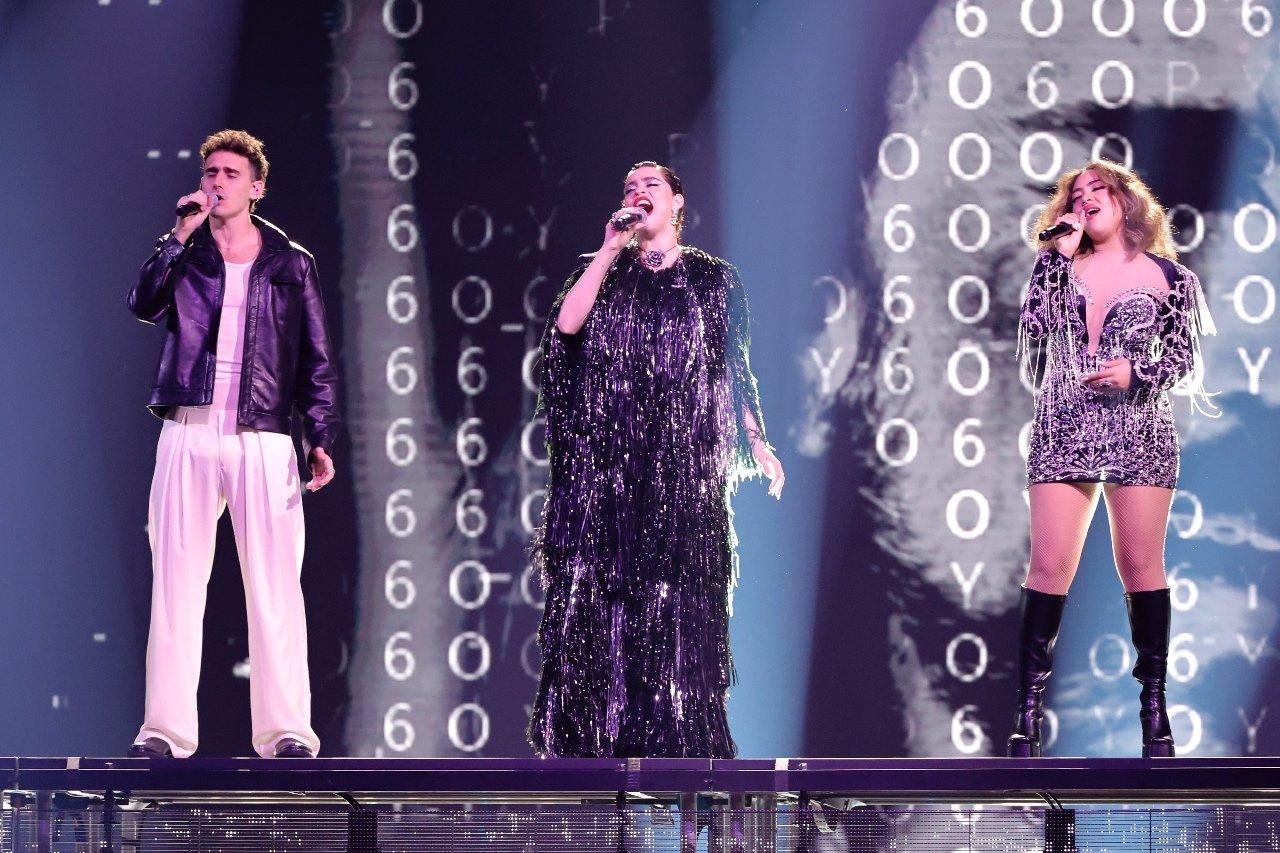
Photo: Kevin Winter/Getty Images for Latin Recording Academy
list
10 Incredible Moments From The 2023 Latin GRAMMYs: Rosalía, Shakira, Peso Pluma & More
The 2023 Latin GRAMMYs were truly international, embracing sounds of flamenco, norteño, reggaetón, and everything in between. Read on for 10 of the most exciting moments from the Biggest Night In Latin Music.
It is not a coincidence that the 24th annual edition of the Latin GRAMMYs took place in Sevilla, Spain — far away from the traditional epicenters of Latin music production. More than ever before, the sound of the Latin GRAMMYs are truly international, embraced by fans all over the world.
At a time of unprecedented global turmoil and collective anxiety, the songs of Bad Bunny, Shakira, Peso Pluma and Rosalía — to name a few of many reigning stars — have enough zest, honesty and passion in them to provide comfort. Both Spain and Latin America boast a long standing tradition of healing through rhythm and melody. Not surprisingly, this year's ceremony felt like a casual gathering of friends for an evening of dancing and celebrating.
From the strains of flamenco to the boom of Mexican music and the ongoing permutations of reggaetón, these are the takeaway points from the unforgettable 2023 Latin GRAMMYs.
The Genius Of Rosalía Transcends Her Own Songbook
It was only fitting that Rosalía — one of the most visionary singer/songwriters in global pop — should open up the first Latin GRAMMY ceremony in Spanish territory.
She could have certainly taken advantage of the opportunity to drop a new single or perform one of her many hits. Instead, Rosalía sang an achingly beautiful version of the 1985 classic "Se Nos Rompió El Amor" by the late singer Rocío Jurado. It was a lovely way to deflect the spotlight and focus on celebrating her Spanish roots.
Spain And Latin America Make Beautiful Music Together
From beginning to end, the telecast underscored the organic kinship that unites the music of Spain and Latin America. It took place during the International Day of Flamenco, and the transcendent genre was present in Alejandro Sanz's moving performance of "Corazón Partío." The award for Best Flamenco Album, won by Niña Pastori for Camino, was presented during the main ceremony — a GRAMMY first.
Later in the telecast, Spanish pop singer Manuel Carrasco and Colombian artist Camilo performed an acoustic duet of "Salitre." They were soon joined by Brazilian singer IZA Texas-born producer/songwriter Edgar Barrera, transforming the Sevilla stage with Carnivalesque energy.
Hell Hath No Fury Like A Pop Star Scorned
Since its release in January, “Shakira: Bzrp Music Sessions, Vol. 53,” the collaboration between Shakira and Argentine producer Bizarrap, has become a global cultural phenomenon. Not only is it a grand pop song with slick EDM accents, but the Colombian diva's lyrics struck a chord with its message of empowerment and fortitude in the face of adversity.
The duo's brisk performance — preceded by a brief intro with Shaki showcasing her tango dancing skills — was an iconic pop culture moment. The track itself won awards in the Best Pop Song and Song Of The Year categories.
Emerging Talent Is The Lifeline That Keeps Latin Music Alive
Watching young artists performing together with the legends that inspired them is a Latin GRAMMY staple. This year was particularly poignant, as Colombian singer/songwriter Juanes performed a moving rendition of the atmospheric rocker "Gris" — about overcoming a relationship crisis — with majestic background vocals provided by six of the 10 Best New Artist nominees: Borja, Natascha Falcão, GALE, Paola Guanche, León Leiden and Joaquina — who ended up winning the award.
For Mexico, The Time Is Now
The moment was ripe for the richness and depth of música Mexicana to shine on an international scale. 2023 was the year when the entire world fell in love with the strains of banda, norteño and corridos tumbados.
The infectious collaboration between Peso Pluma and Eslabón Armado, "Ella Baila Sola" became the emblem of this revolución mexicana. A buoyant rendition of the track was a telecast highlight, as well as the performance by Carín León, who won the award for Best Norteño Album.
Laura Pausini's Artistry Evokes The Elegance Of Decades Past
Introducing herself as "the most [expletive] Latina Italian woman in the world," Laura Pausini seemed overjoyed with her Person Of The Year award. Her medley of career highlights — full of drama and gorgeous melodies — included nods to her first mega-hit, the nostalgic "La Solitudine," and the cinematic "Víveme."
"I thank my father because he chose not to go to the movies with my mom, and instead stayed at home, made love to her and had me, the Person Of The Year," Pausini quipped. Her songbook evokes the golden era of Latin pop, a time of elegance and style.
Radical Genre Bending Never Fails To Intrigue
Latin music is currently experiencing a moment of grace, and this creative apex is frequently expressed through intriguing fusions of seemingly disparate styles. The adrenaline-fueled performance by Puerto Rican neo-reggaetón star Rauw Alejandro gained in electricity when he was joined by Juanes on a rocked-up rendition of "BABY HELLO."
Elsewhere, Carín León's duet with Maluma and Bizarrap's foray into electro-tango were fueled by a similar spirit of playful experimentation.
Exquisite Singing & Songwriting Will Never Go Out Of Style
There's something to be said about an album that was recorded live on tape with analog equipment — the singer surrounded by her band, as they perform together in the same space, with no outside guests allowed.
Natalia Lafourcade's "De Todas Las Flores" is all about feeling and warmth, her vulnerable vocals framed by delicate piano notes and supple percussion. A worthy Record Of The Year winner, this exquisitely layered track proposes that some traditional methods of music making are definitely worth preserving. At the Premiere Ceremony, Lafourcade also took home golden gramophones for Best Singer-Songwriter Song and Best Singer-Songwriter Album.
Hip-Hop Is A Natural Component Of The Latin Music DNA
At the tail end of the ceremony, the performance by Colombian vocalist Feid — aided by the stellar skills of producer DJ Premier — included a moody reading of "Le Pido a DIOS" with nods to '90s rap and jazzy keyboard flourishes. Just like EDM, hip-hop has been fully incorporated into the Latin music lexicon, assuming an identity of its own.
KAROL G Is Much, Much More Than Just A Global Pop Star
Just like Rosalía's Motomami, KAROL G's fourth studio LP – winner of the coveted Album Of The Year award — will be remembered for the dazzling quality of its songs and the kind of indelible magic that can only be experienced, not described. The Colombian singer's artistic partnership with producer Ovy On The Drums has resulted in a futuristic sound that leaves ample space for the warmth of her vocals — and it grooves like crazy.
Most importantly, MAÑANA SERÁ BONITO celebrates the small pleasures, the brief glimpses of inner peace, and the decision to embrace self-acceptance even in the wake of emotional storms. In KAROL G's world, optimism is the only pathway out to a better tomorrow.
2023 Latin GRAMMYs: See The Complete Winners & Nominations List
